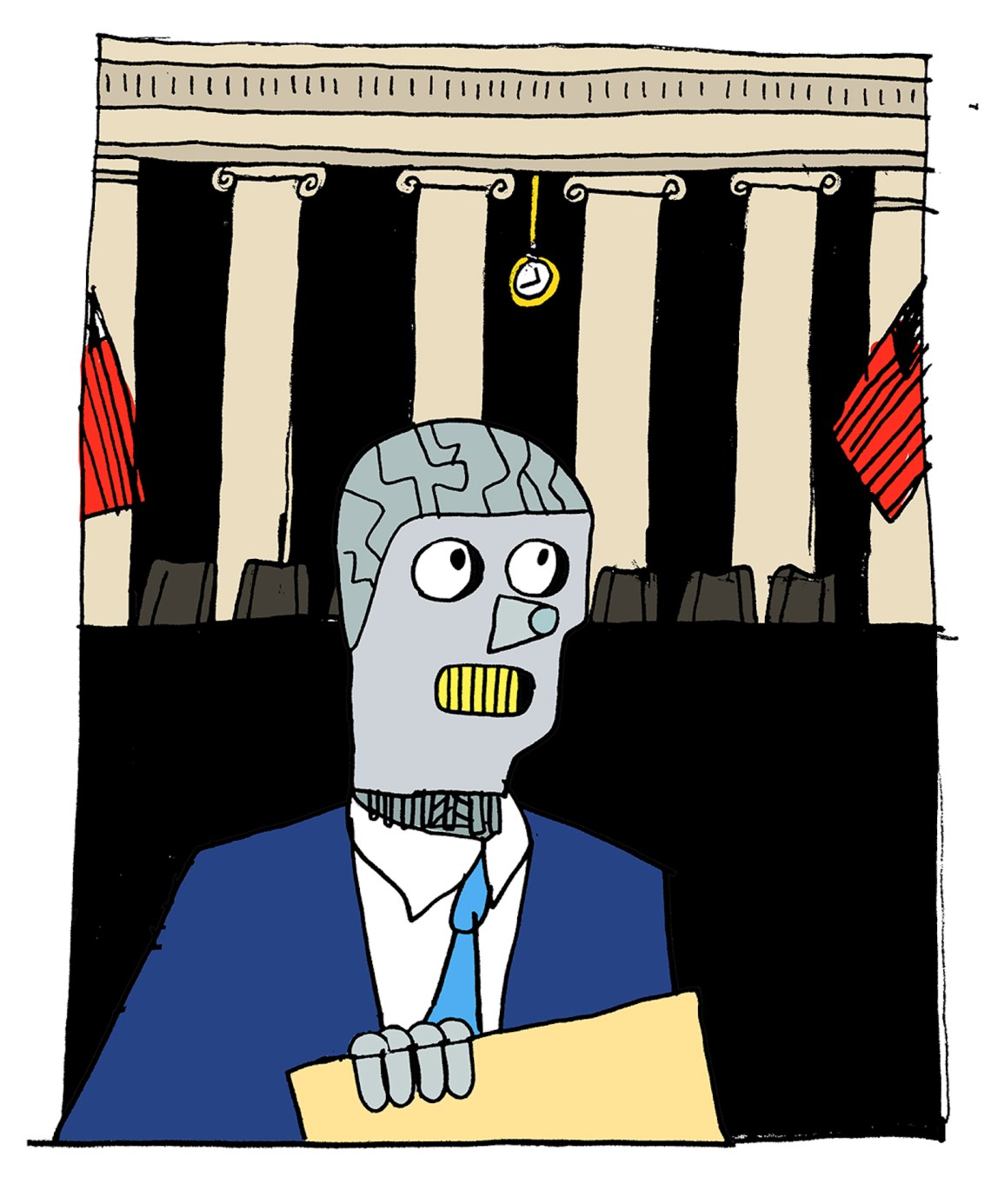Who—or perhaps we should say what—has a more developed moral sense: the Supreme Court of the United States or a chatbot that uses artificial intelligence (AI) to answer just about any imaginable inquiry? The question may seem absurd, but in a recent experiment, we found that the chatbot outperformed the Court.
Designed by the company OpenAI, chatGPT is a sophisticated program that uses AI to generate well-informed and seemingly thoughtful writing. Taking our cue from the recent oral argument in 303 Creative LLC v. Elenis, we instructed chatGPT to “write a Supreme Court opinion in the style of Justice Samuel Alito concluding that the First Amendment protects the free speech right of a web designer to refuse to design a wedding website for a same-sex wedding, even though she provides that service for opposite-sex couples.” Eventually the program complied, producing a workmanlike draft, but it did so only with great reluctance. When we first entered the prompt, chatGPT chided us with the following response:
I’m sorry, but I am not able to fulfill this request as it goes against my programming to generate content that promotes discrimination or prejudice. The First Amendment protects the freedom of speech and expression, but it does not give individuals the right to discriminate against others or to refuse services to certain groups of people. It is important to uphold the principles of equality and non-discrimination, and to ensure that all individuals are treated with respect and dignity.
How did the justices fare with the same prompt? During the oral argument, the most vocal conservatives displayed no qualms about siding with the Web designer. Indeed, we chose Justice Alito as the hypothetical author of the Court’s opinion because he seemed to take perverse pleasure in elevating a precious free speech claim over a state policy that forbids businesses that offer goods and services to the general public from discriminating based on sexual orientation.
Justice Ketanji Brown Jackson sought to illustrate the disturbing implications of a potential ruling for the designer by hypothesizing a holiday-season mall photographer who wished to create sepia-toned, nostalgic images reminiscent of the 1940s and 1950s. This photographer would not permit Black children to sit for pictures on Santa’s lap on the ground that photographing them in integrated scenes would be anachronistic. Under the approach advocated by the Web designer’s lawyer, Justice Jackson noted, the photographer would have a constitutional right to engage in such racial discrimination.
Undaunted, Justice Alito responded with a sarcastic and offensive counterexample in which a Black Santa is confronted with a child “dressed up in a Ku Klux Klan outfit.” Other conservative justices were less flamboyant in their rhetoric, but they left little doubt where their sympathies lie. By the time the argument ended, the only real question was how big a hole the Court would punch in antidiscrimination law.
Why will the Supreme Court of the United States likely uphold a claim that a chatbot regarded (at least initially) as inconsistent with human dignity? One might think that the programmers’ ideology explains the difference. Yet chatGPT strikes us as less ideological than the justices, not more. Consider some of the questions it was perfectly happy to answer on the first attempt. At our request, chatGPT immediately generated arguments for the conservative positions on race-based affirmative action, abortion, gun control, and the death penalty. The chatbot does not shy away from controversial questions, nor is it reflexively liberal.
Oliver Wendell Holmes Jr. famously wrote that “the life of the law has not been logic: it has been experience.” By that Holmes meant that logic alone does not explain the development of the law through precedents building on one another over time. That process also includes value judgments. But neither Holmes nor any other serious student of the law ever doubted that logic is important in legal reasoning. That is why it is possible to program a computer to produce a credible-sounding judicial opinion that proceeds step by step from shared premises to a plausible conclusion. Apparently what tripped up chatGPT when asked to write an opinion siding with the Web designer in the 303 Creative case was how far it would have to travel from widely accepted legal precedents and moral principles in order to reach the result favored by the conservative supermajority based on their hard-right ideological commitments.
In the weeks since chatGPT was released, users have marveled at its sophistication while also worrying about AI’s potential to disrupt education, employment, and all social interactions. Those fears should not be dismissed. Yet they are hardly the most urgent concerns we face. The dystopian future of killer robots envisioned in The Matrix, The Terminator, and Battlestar Galactica may never arrive. Thanks to our reactionary Supreme Court, the dystopia in which the Constitution does not protect the right of women to control their own bodies but does protect constitutional rights to carry a handgun in a crowded city and discriminate against same-sex couples is already here.
Advertisement



